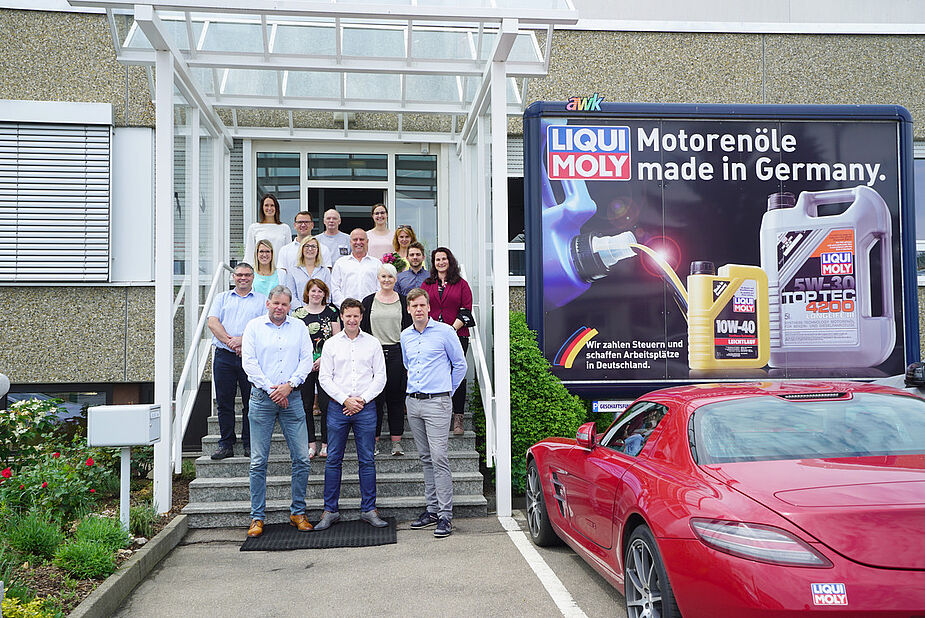- 06/06/2019
- Company
LIQUI MOLY job machine at full throttle
June 2019 – LIQUI MOLY's products ensure that engines and other machines purr flawlessly. Its job machine is reliably running at full throttle too. During the first half of the year, the German oil and additive specialist added 67 new employees to its staff, 19 of them in May and June alone. The new recruits have joined head office, the oil factory, the Portuguese subsidiary and the Dutch sales team.
Eleven of the 19 newest recruits joined the head office team in Ulm. Six additional employees are now employed at the Saarland oil factory. Two colleagues have started work at LIQUI MOLY Iberia. This subsidiary, which looks after the Spanish peninsular, has its headquarters in Portugal. Two sales people were also recruited for the Dutch sales team. This means that the lubricant specialist now employs 890 people. In total, 67 new recruits have been employed during the first half of 2019. This is the equivalent of an eight percent increase.
The majority of LIQUI MOLY employees work at the Ulm site. There are almost 390 employees there. LIQUI MOLY Iberia employees 15 people. The subsidiaries in South Africa and the USA each employ 31 people. And the newly founded Italian subsidiary has six employees.
LIQUI MOLY recently published its 2018 balance sheet, and emphasized its plans to continue its growth strategy. "We are reliant on well-educated people for this. It is only logical, in my view, that the most important number for a company to increase is the amount of personnel," says CEO Ernst Prost.
It has been, and continues to be, increased in nearly all areas; in human resources, in research and development, in sales (back office and sales force), in production, in logistics and in accounts. "Sales is the key role. The turnover, revenue and, ultimately, economic success of a company all depend on its selling power." When it comes to exporting, it works best if there is a dedicated sales force in the country. With this philosophy in mind, two technical sales people have been added to the Spanish peninsular team. And two new sales colleagues have been employed in the Netherlands too.
New sales people have also been recruited for the domestic market. "Every company is exposed to risks. Naturally, it attempts to minimize them," says Ernst Prost. In LIQUI MOLY's case, diversification is an important idea. For example, the company is well positioned with its wide product range. "To take just one example, we do not just sell products for cars, but for other types of vehicle too," says the CEO. Correspondingly, there are specialist sales teams for car products as well as for commercial vehicles. These are currently being strengthened.
Whether in Germany, or the rest of the world, products "made in Germany" have a very good reputation, despite the recent diesel scandal in the automotive sector. Ernst Prost: "That is a valuable asset that we can build on and which more than compensates for the higher production and personnel costs we have compared to other countries. Premium products and wage dumping do not go together. We need first class, well-educated employees." In order to attract and keep such employees, the right salaries must be paid. "The people need to feel good too." LIQUI MOLY provides such conditions and so many employees have been with the company for decades. "In an ideal world, their partners and offspring work here too. That, to me, is a real family company," says the LIQUI MOLY boss.
Furthermore, for him, the social responsibility of an employer and company plays an important role. "We are drawing ever closer to an employee count of 900," says Ernst Prost, pleased. He knows that "these jobs strengthen their local areas through taxes and duties, and that local economies benefit from people who have secure, well paid jobs."
On top of all that, the economic success of the company and its CEO means that they are in a position to do some good, for example through the three foundations that Ernst Prost has set up. "There is no point or meaning to having and earning money, if it cannot be used to create meaning."




